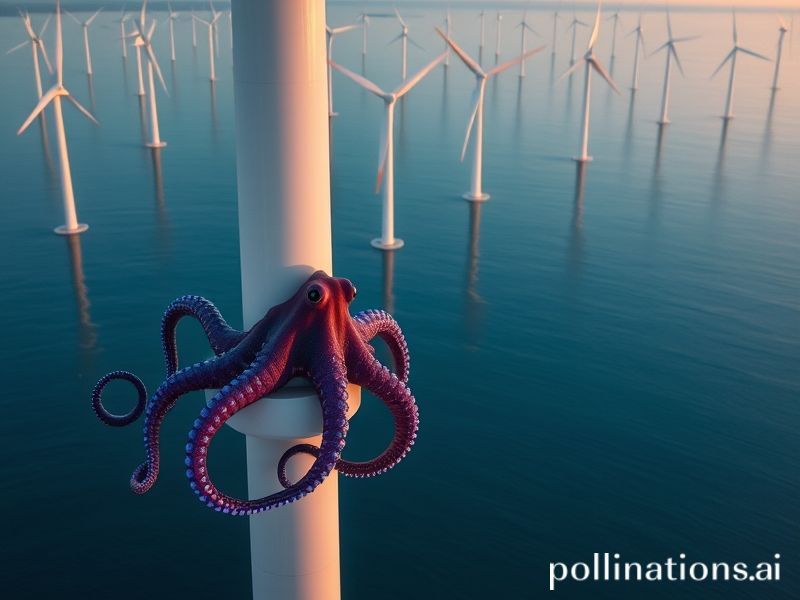Octopus Energy’s Global Tentacle Tango: How a British Mollusc Is Squeezing the World’s Grids
Octopus Energy: When Eight Arms Aren’t Enough to Hug the Planet, Apparently
By Dave’s International Desk of Mildly Cynical Optimism
LONDON—In the grand global tradition of naming corporations after creatures that would happily dine on us given half a chance, Octopus Energy has slithered from a British start-up to a multi-tentacled empire now fondling grids from Texas to Tokyo. The firm just announced it’s feeding renewable electrons to another three million German homes, bringing its total customer base to roughly 5.7 million—about the population of Denmark, if Denmark were slightly colder and more neurotic about electricity prices.
Let us pause to admire the sheer audacity. In a decade when most energy giants are busy green-washing like a spin cycle on meth, Octopus has somehow convinced regulators on four continents that a cephalopod-themed utility is the safest pair of hands for the energy transition. Picture the scene in some marble-clad Brussels conference room: EU commissioners nodding gravely while a man in sneakers explains his “Kraken” software platform will balance the grid using algorithms and good vibes. The commissioners, still scarred from the last time Russia sneezed and half the continent caught hypothermia, sign on the dotted line. If irony burned calories, Europe would be beach-season ready.
But the tentacles don’t stop at Europe. Down in Texas—where the state motto might as well be “Hold my beer and watch this grid fail”—Octopus Energy USA is gamely persuading Lone Star residents to let a British octopus manage their air-conditioning destiny. Texans, famously relaxed about federal oversight, seem untroubled by the thought of a foreign mollusc scheduling their dishwasher at 3 a.m. to save 14 cents and a polar bear. Meanwhile in Japan, a country that once built a 60-foot robot Gundam for fun, the idea of importing foreign software to manage delicate frequency fluctuations is greeted with the stoic acceptance reserved for Godzilla attacks and seasonal hay fever.
The broader significance? Octopus is less an energy company and more a planetary-scale bet that human beings will consent to be nudged, cajoled, and algorithmically nagged into sustainability. Its secret sauce, the aforementioned Kraken, is basically a very polite HAL 9000. It reads your meter, judges your consumption, and texts you things like, “Hey, lovely human, fancy shifting your laundry to 2:13 a.m. when the wind is guilt-free?” You, exhausted from late-stage capitalism, mumble “sure” because resistance requires effort and the kettle is already on. Multiply that interaction by millions and suddenly coal plants look as outdated as fax machines or principled politicians.
Of course, no international expansion is complete without the requisite geopolitical side-eye. Australia welcomed the octopus with open arms, then immediately accused it of jacking up prices during a heatwave—classic Aussie hospitality. South Korea inked a partnership faster than you can say “K-pop comeback,” but only after ensuring the data stays onshore, presumably so the octopus can’t learn which citizens are binge-reheating kimchi at 4 a.m. And in Brazil, where the rainforest is still being swapped for steaks, Octopus is marketing “100% renewable” plans sourced from hydro dams that environmentalists insist are basically soggy bulldozers. Somewhere a PR intern is Googling “how to rebrand ecological grief.”
Naturally, the firm’s founder, Greg Jackson, insists it’s all about “customer-obsessed decarbonisation,” a phrase that sounds suspiciously like something you’d overhear in a San Francisco co-working space between gluten-free muffins. Still, the numbers are annoyingly persuasive: 40% cheaper bills, 90% customer satisfaction, and a carbon footprint per kilowatt-hour that makes traditional utilities look like they’re burning tyres for sport.
So where does this leave the rest of us, shivering in our drafty apartments while the planet runs a fever? In the mildly comforting embrace of a technocratic octopus, apparently. It’s not the hero we deserve—heroes usually have better branding—but it may be the anti-hero we need: cold-blooded, efficient, and just sentient enough to remind us that salvation now comes with push notifications and a monthly PDF. Until the next blackout, at least, the tentacles remain firmly, politely, in charge.







